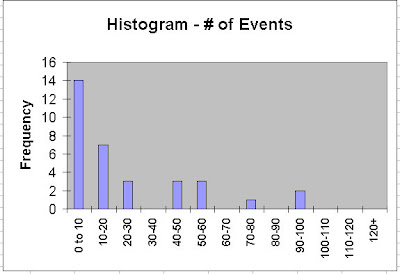Following up on Part 1 of the survey results, we'll now explore some of the results and lessons learned from event-driven Lean activities in hospitals and health systems (done under names such as Kaizen Events, Rapid Process Improvement Workshops, and Rapid Improvement Events).
Question 4 asked: How many events has your hospital or health system completed?
Most answered specified that the response was for a single hospital, so all data were combined into a single histogram, shown below:
 The highest response was “100+” kaizen events for a hospital that has been implementing Lean since 2004, so that's roughly 20-25 events a year, which is not an unreasonable pace if you have a few facilitators. That particular hospital also reports using other Lean methods beyond week-long events.
The highest response was “100+” kaizen events for a hospital that has been implementing Lean since 2004, so that's roughly 20-25 events a year, which is not an unreasonable pace if you have a few facilitators. That particular hospital also reports using other Lean methods beyond week-long events.
Another hospital that reported 75 events has completed those in two years of Lean implementation. The most aggressive pace was a hospital that stated their goal was implementing 48 events per year. If you have enough facilitators, given the number of value streams and departments in a hospital, it's reasonable to think you could do 48 in a year. I know when I was facilitating events in manufacturing, having more than one a month was difficult if you were going to do enough prep and follow up activity. It's not just the event itself that's time consuming. If you read about the Virginia Mason Medical Center event methodology (that's discussed in my book), there are multiple weeks of planning, training, and data collection before the actual event.
Another hospital stated they did 60 events in 2007 (and didn't say anything about 2008). I wonder what happened? Did they stop doing events? They reported a 50% sustainment rate, so it doesn't sound like the events were a total failure…
Question 5 asked: What percentage of events have a significant impact initially?
Question 6 asked: What percentage of events have SUSTAINED results (i.e., no significant backslide, no need to repeat event)?
The results are shown in the table, below:
The results show that it is more difficult to sustain improvements — something that we probably would have intuitively predicted.
11 out of 33 respondents claimed an initial 100% success rate and 7 out of 33 claimed 100% sustainment success. The low end of scale included one respondent who stated 0.5% (I don't think I misinterpreted this, as they typed in a percentage, I don't think they meant 0.5=50%). I'll post the full response set in the post comments. A few respondents said “it's too early to tell” about their sustainment success, as they are very early into their Lean journey.
If you have any questions about the survey results, please post them in the comments section below…
There were many interesting “lessons learned” comments. I'm going to organize those and save them for a third and final blog post on the survey.
What do you think? Please scroll down (or click) to post a comment. Or please share the post with your thoughts on LinkedIn – and follow me or connect with me there.
Did you like this post? Make sure you don't miss a post or podcast — Subscribe to get notified about posts via email daily or weekly.
Check out my latest book, The Mistakes That Make Us: Cultivating a Culture of Learning and Innovation:











Full data set for initial sustainment (sorted:
% Initial Impact
100%
100%
100%
100%
100%
100%
100%
100%
100%
100%
100%
90%
80%
80%
80%
80%
75%
75%
75%
75%
75%
66%
65%
60%
50%
50%
50%
50%
50%
50%
40%
30%
0.50%
Not sure kaizen events are a good measure of anything. I’ve been to a few world class lean plants and there is continuous improvement everywhere but not kaizen events. Me thinks kaizen events are concoction of consultants or a first step for mediocre or worse organizations to pay off their lean experiment.
Anonymous – I agree with you 100% about the number of events not being the primary goal.
I’m not a “kaizen events guy” myself. I don’t use them in my consulting work and I don’t recommend them as a cure all. But my research here was done out of curiosity for those hospitals that *are* using events, since they are so predominant (I think unfortunately so, at times).
I’m trying to help promote an alternative approach (through my book and my work) that helps create real continuous improvement in an organization. That’s much harder to pull off than a number of events.
[…] success rates, with the use of Events or Lean in hospitals. I’ll plan on publishing this Part 2 on Monday, December 22. I’ll also have a Part 3 with lessons learned […]
[…] 3 of the results from my online survey about Kaizen Events in healthcare. You can find Part 1 and Part 2 in previous […]